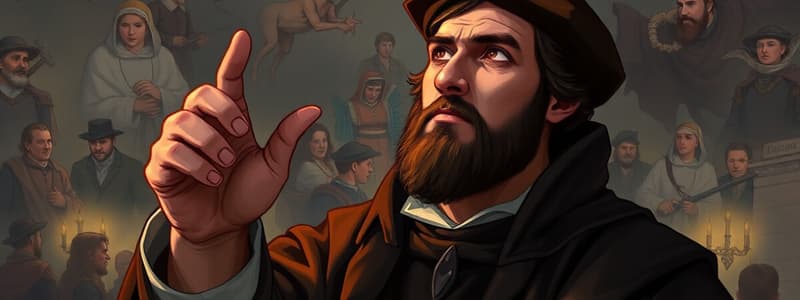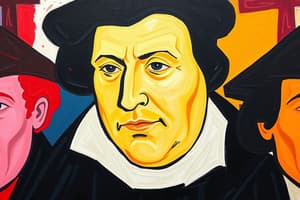Podcast
Questions and Answers
What was one major complaint of the Germans against the Roman Catholic Church?
What was one major complaint of the Germans against the Roman Catholic Church?
- The church promoted local rulers over popes.
- The pope was too lenient with sinners.
- Church fees and taxes impoverished the common people. (correct)
- The church supported foreign governments.
Who was the spiritual leader of the Catholic Church during the period described?
Who was the spiritual leader of the Catholic Church during the period described?
- A local bishop
- Martin Luther
- The Holy Roman Emperor
- The pope (correct)
What was the primary reason many Germans resented the church's clergy?
What was the primary reason many Germans resented the church's clergy?
- They preached in a foreign language.
- They refused to collect tithes from locals.
- They lived in lavish lifestyles in Rome.
- They were often from different countries. (correct)
What did excommunication from the church imply for believers?
What did excommunication from the church imply for believers?
What significant action did Martin Luther take in 1517?
What significant action did Martin Luther take in 1517?
How did popes use their power in Western Europe?
How did popes use their power in Western Europe?
What societal structure was established in Central Europe during the early 16th century?
What societal structure was established in Central Europe during the early 16th century?
What year is significant in relation to Martin Luther's challenges to the Catholic Church?
What year is significant in relation to Martin Luther's challenges to the Catholic Church?
What was one consequence of Martin Luther's emphasis on literacy and education?
What was one consequence of Martin Luther's emphasis on literacy and education?
What was a significant factor that contributed to the split of Lutheranism?
What was a significant factor that contributed to the split of Lutheranism?
How did Luther respond to other Protestant reformers like John Calvin?
How did Luther respond to other Protestant reformers like John Calvin?
What did Luther believe about infants and baptism?
What did Luther believe about infants and baptism?
What effect did the Protestant Reformation have on the Holy Roman Empire?
What effect did the Protestant Reformation have on the Holy Roman Empire?
What was one of Luther's views regarding Jews?
What was one of Luther's views regarding Jews?
What did the Catholic Church attempt to do in response to the Protestant Reformation?
What did the Catholic Church attempt to do in response to the Protestant Reformation?
What was a paradoxical aspect of Martin Luther's life?
What was a paradoxical aspect of Martin Luther's life?
What event led Luther to devote his life to God?
What event led Luther to devote his life to God?
What was the purpose of selling indulgences during the 16th century?
What was the purpose of selling indulgences during the 16th century?
What did Luther believe was necessary for salvation?
What did Luther believe was necessary for salvation?
What was included in Luther's 'Ninety-Five Theses'?
What was included in Luther's 'Ninety-Five Theses'?
Who intervened on Luther's behalf after he was declared a heretic?
Who intervened on Luther's behalf after he was declared a heretic?
What technology helped spread Luther's ideas rapidly?
What technology helped spread Luther's ideas rapidly?
What was the outcome of Luther's appearance at the Imperial Diet?
What was the outcome of Luther's appearance at the Imperial Diet?
What significant translation did Luther complete during his time in hiding?
What significant translation did Luther complete during his time in hiding?
What did Luther advocate for in his later life concerning education?
What did Luther advocate for in his later life concerning education?
What was a common misconception about indulgences in the 16th century?
What was a common misconception about indulgences in the 16th century?
What action did Luther take on October 31, 1517?
What action did Luther take on October 31, 1517?
What was Luther's view on the authority of priests?
What was Luther's view on the authority of priests?
What did Luther accuse the church of regarding church officers?
What did Luther accuse the church of regarding church officers?
What was Luther's position on the use of Latin in Catholic mass?
What was Luther's position on the use of Latin in Catholic mass?
Flashcards
Catholic Church
Catholic Church
The dominant Christian church in Western Europe for centuries, centered in Rome. It controlled religious practices, enforced doctrines, and held significant political power.
Excommunication
Excommunication
The act of being expelled from the Catholic Church, depriving a person of its sacraments and blessings, and threatening their salvation.
What was the role of the Pope?
What was the role of the Pope?
The Pope, head of the Catholic Church, held ultimate authority on religious doctrine. His decisions were considered final and binding.
What were the complaints against the Catholic Church in Germany?
What were the complaints against the Catholic Church in Germany?
Signup and view all the flashcards
Holy Roman Empire
Holy Roman Empire
Signup and view all the flashcards
Martin Luther
Martin Luther
Signup and view all the flashcards
What is the significance of Martin Luther's actions?
What is the significance of Martin Luther's actions?
Signup and view all the flashcards
Luther's Impact on Education
Luther's Impact on Education
Signup and view all the flashcards
Luther's View on Scripture
Luther's View on Scripture
Signup and view all the flashcards
Luther's Main Complaint
Luther's Main Complaint
Signup and view all the flashcards
Split Within Protestantism
Split Within Protestantism
Signup and view all the flashcards
The Catholic Counter-Reformation
The Catholic Counter-Reformation
Signup and view all the flashcards
Luther's Legacy
Luther's Legacy
Signup and view all the flashcards
Religious Divisions in Europe
Religious Divisions in Europe
Signup and view all the flashcards
Enduring Religious Intolerance
Enduring Religious Intolerance
Signup and view all the flashcards
Indulgence
Indulgence
Signup and view all the flashcards
Penance
Penance
Signup and view all the flashcards
Martin Luther's Main Belief
Martin Luther's Main Belief
Signup and view all the flashcards
What were Luther's 95 Theses?
What were Luther's 95 Theses?
Signup and view all the flashcards
Luther's Conflict with the Pope
Luther's Conflict with the Pope
Signup and view all the flashcards
How did the Printing Press impact the Reformation?
How did the Printing Press impact the Reformation?
Signup and view all the flashcards
What were the main criticisms of the Catholic Church by Luther and his followers?
What were the main criticisms of the Catholic Church by Luther and his followers?
Signup and view all the flashcards
What was the Imperial Diet?
What was the Imperial Diet?
Signup and view all the flashcards
What was Luther's response to the Imperial Diet?
What was Luther's response to the Imperial Diet?
Signup and view all the flashcards
What happened to Luther after the Imperial Diet?
What happened to Luther after the Imperial Diet?
Signup and view all the flashcards
What were some of Luther's actions during his exile?
What were some of Luther's actions during his exile?
Signup and view all the flashcards
What was the impact of Luther's translation of the New Testament?
What was the impact of Luther's translation of the New Testament?
Signup and view all the flashcards
What was Luther's view on education?
What was Luther's view on education?
Signup and view all the flashcards
Why did Luther argue for priests to marry?
Why did Luther argue for priests to marry?
Signup and view all the flashcards
What was the major impact of Luther's work?
What was the major impact of Luther's work?
Signup and view all the flashcards
Study Notes
The Protestant Reformation: Luther's Challenge
- 1000 years, Western European Christians were Catholic, valuing sacraments, confession, prayers, donations, and "works" for salvation. Pope was supreme spiritual leader.
Rise of German Discontent
- Early 16th century: Western European kings gained power; Holy Roman Empire fractured into independent German principalities.
- The Catholic Church held significant political and military power, using it to expand influence. German nobles and commoners felt exploited by Church fees, taxes, and the appointment of foreign clergy.
- Germans resented the exemption of clergy from taxes and viewed them as prioritizing wealth over spiritual guidance. Excommunication, for failing to meet the church's demands, was a severe threat.
Martin Luther's Revolt
- 1517: Martin Luther, a German priest and professor, challenged the Church challenging the legitimacy of papal authority.
- Luther, devoted to God following a near-death experience, trained as a priest, and became a professor.
- Luther believed salvation was achieved through faith in Jesus Christ and God's grace, not through "works."
Indulgences and Luther's Theses
- Indulgences: Certificates forgiving sins in exchange for donations. Popes encouraged their sale.
- Luther found indulgences and related "works" to be fraudulent.
- October 31, 1517: Luther posted his Ninety-Five Theses, criticizing indulgences and other church practices, and rejecting the pope's authority.
- Luther's theses spread rapidly through the printing press, making him a household name.
Papal Response and German Intervention
- Pope Leo X summoned Luther to Rome to answer the accusations.
- Frederick the Wise, a German noble, intervened and called for Luther's appearance before German judges.
- A compromise led to Luther appearing before a papal representative in Germany in 1518.
- Luther refused to renounce his conscience, based on the scriptures.
Luther's Writings and Spread of Protestantism
- Luther and other pamphleteers used the printing press to publish numerous pamphlets criticizing the Church; They became known as Protestants.
- Their pamphlets included demands for priests to marry, fewer sacraments, and services in the vernacular German.
- They advocated for the people to choose their ministers and determine their own beliefs based on the Bible.
Diet of Worms
- 1521: Charles V, the Holy Roman Emperor, summoned Luther to the Diet of Worms.
- Luther refused to renounce his beliefs, famously stating, "My conscience is captive to the Word of God, I cannot and will not recant."
- Charles V declared Luther a heretic and outlaw.
- Frederick the Wise hid Luther for nearly a year.
Building of a New Church
- Luther leveraged his enforced isolation to write more, preach, compose hymns, and translate the New Testament into German.
- Luther married and had children. He stressed the importance of education, especially for girls.
- The Protestant emphasis on education and literacy had a profound impact on the rise of modern Europe
- Lutheranism split into different Protestant churches eventually.
Religious Conflicts and Luther's Death
- Luther's ideas spread, gaining favor in Northern Germany, but the southern part remained Catholic
- Luther believed reconciliation with the Catholic Church was impossible
- Further protestant reformation conflicts, and disagreements among Protestant leaders, and intolerance arose from Luther's followers.
- Luther's emphasis on education and literacy, initiated the scientific revolution. Wars between Protestants and Catholics led to enduring religious tensions, eventually shaping the national unification of Germany in the 1800s.
- Luther is notable for advancing Religious Freedom (Freedom of Conscience) despite being intolerant to dissenting opinions.
Studying That Suits You
Use AI to generate personalized quizzes and flashcards to suit your learning preferences.




